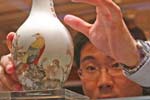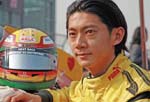Asia
Banking stem cells could save Japan nuke workers
Updated: 2011-04-15 10:00
(Agencies)
CHICAGO - Health officials should collect blood from workers at the crippled Fukushima Daiichi nuclear power plant in case they are accidentally exposed to high levels of radiation and need a stem cell transplant, Japanese researchers said on Thursday.
|
![Handout photo from the Japan's Nuclear and Industrial Safety Agency shows Tokyo Electric Power Co workers recording the status of instruments in a control room at the Fukushima Daiichi Nuclear Power Plant in Tomioka, Fukushima Prefecture northeastern Japan March 23, 2011. [File photo/Agencies] Banking stem cells could save Japan nuke workers](../../attachement/jpg/site1/20110415/002170196e1c0f11e85453.jpg) Handout photo from the Japan's Nuclear and Industrial Safety Agency shows Tokyo Electric Power Co workers recording the status of instruments in a control room at the Fukushima Daiichi Nuclear Power Plant in Tomioka, Fukushima Prefecture northeastern Japan March 23, 2011. [File photo/Agencies] |
They said gathering blood from the workers would give them a ready source of their own stem cells that could help rebuild their bone marrow should they become exposed to high levels of radiation.
"The danger of a future accidental radiation exposure is not passed, since there has been a series of serious aftershocks even this April," Dr Shuichi Taniguchi of Toranomon Hospital in Tokyo and Dr Tetsuya Tanimoto of the Japanese Foundation for Cancer Research wrote in the Lancet medical journal.
Tokyo Electric Power Co said this week the situation at the nuclear plant, wrecked by a 15-meter (49.2-foot) tsunami on March 11, had stabilized. The crisis is now rated par with the world's worst nuclear accident, the 1986 Chernobyl disaster, although the total release of radiation at Chernobyl was far greater.
The researchers say transplant teams are standing by in Japan and Europe to collect and store the nuclear workers' cells, but so far the Nuclear Safety Commission of Japan is balking because it would cause a "physical and psychological burden for nuclear workers," the team wrote.
Collecting cells from the workers has several advantages over donated cells, which require finding a matching donor and carry the risk of rejection.
Stem cell transplants from a person's own cells would allow the workers to avoid taking drugs to suppress the immune system, helping them to better resist infections. The cells could quickly restore normal function to the body's machinery for making blood cells.
And the workers' cells could be banked and stored in case they develop leukemia, which could happen years down the road.
But the solution is not perfect, the team admits. High exposure to radiation would also attack cells in the gut, skin or lung -- problems a stem cell transplant could not fix.
Yet, with containment and clean-up efforts at the damaged plant expected to drag on for months or even years, Tanimoto and Taniguchi say taking steps to protect the workers' from future harm is paramount.
"The most important mission is to save the nuclear workers' lives and to protect the local communities," the team wrote.
"Such an approach would be the industry's best defense: if a fatal accident happened to the nuclear workers, the nuclear power industry of Japan would collapse."
Specials

Share your China stories!
Foreign readers are invited to share your China stories.

Art auctions
China accounted for 33% of global fine art sales.

Waiting for drivers' seat
Lack of sponsorship appears to be why Chinese drivers have yet to race in a Formula 1 event



